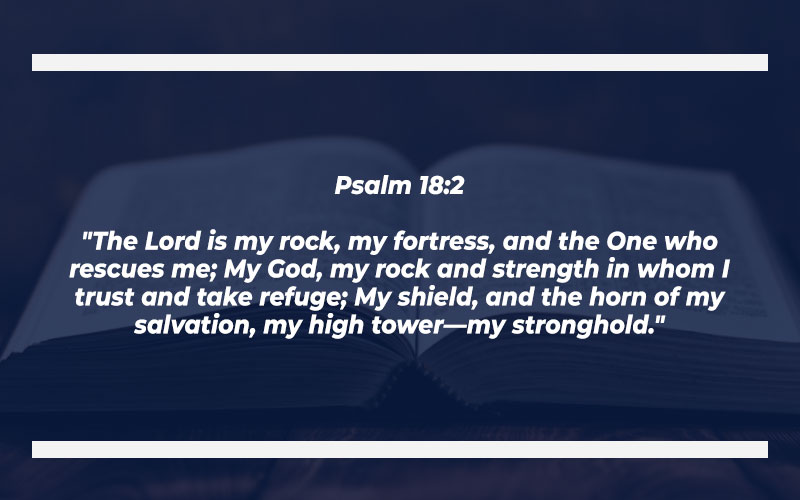Throughout Scripture, rocks are often used as powerful symbols of God’s strength, stability, and protection. From being a refuge to serving as a foundation, the imagery of rocks in the Bible speaks to the enduring and unshakable nature of God’s presence in our lives. Below are verses that highlight the significance of rocks. Do read on!
Also Read: Bible Verses About Seeds
Bible Verses About Rocks
Psalm 18:2
“The Lord is my rock, my fortress, and the One who rescues me; My God, my rock and strength in whom I trust and take refuge; My shield, and the horn of my salvation, my high tower—my stronghold.”

Commentary: This verse illustrates God as a multifaceted protector—our rock, fortress, and refuge. It emphasizes the security and strength found in God, inviting believers to place their trust in Him. The metaphor of a rock suggests permanence and stability, reminding us that God is an unwavering foundation amid life’s uncertainties.
Deuteronomy 32:4
“The Rock! His work is perfect, for all His ways are just; A God of faithfulness without iniquity (injustice), Just and upright is He.”
Commentary: Here, God is depicted as “The Rock,” a symbol of His perfect and just nature. The verse underscores the consistency and righteousness of God’s actions, reassuring believers of His faithfulness. In a world of shifting morals and values, God’s unchanging nature as a just and upright rock offers a reliable foundation for our faith.
Isaiah 26:4
“Trust in the Lord forever, For the Lord God is an everlasting Rock [the Rock of Ages].”
Commentary: This verse calls believers to trust in God indefinitely, recognizing Him as an “everlasting Rock.” The phrase “Rock of Ages” suggests that God’s strength and stability are not confined by time. This eternal aspect of God provides a solid ground for believers to stand on, regardless of the challenges they face.
1 Samuel 2:2
“There is no one holy like the Lord, there is no one besides You, there is no Rock like our God.”
Commentary: In this verse, God’s uniqueness is emphasized—there is no rock like our God. It highlights God’s incomparable holiness and strength. The use of the rock metaphor again reinforces the idea of God as the ultimate source of security and refuge, unmatched by any other.
Psalm 62:6
“He only is my rock and my salvation; My fortress and my defense, I will not be shaken or discouraged.”
Commentary: The psalmist declares God as their sole rock and source of salvation. This verse emphasizes the exclusivity of God’s role as our protector, leaving no room for doubt or fear. The confidence in God as a fortress underlines a faith that remains unshaken despite adversity.
Psalm 61:2
“From the end of the earth I call to You, when my heart is overwhelmed and weak; Lead me to the rock that is higher than I [a rock that is too high to reach without Your help].”
Commentary: This verse captures a plea for divine guidance towards a rock “higher than I.” It symbolizes the pursuit of God’s strength, which is beyond human reach without His assistance. When overwhelmed, believers can find solace in God’s superior strength, knowing He can elevate us above our struggles.
Psalm 18:31
“For who is God, but the Lord? Or who is a rock, except our God,”
Commentary: This rhetorical question underscores the exclusivity of God as the only true rock. It contrasts God with all other supposed sources of strength or security, reaffirming that only He provides an unshakeable foundation for life. The verse invites believers to recognize and worship God as the sole provider of true stability.
1 Corinthians 10:4
“And all [of them] drank the same spiritual drink, for they were drinking from a spiritual rock which followed them; and the rock was Christ.”
Commentary: Paul identifies Christ as the spiritual rock that accompanied the Israelites. This verse connects the Old Testament imagery of the rock with the person of Christ, highlighting His role as the eternal source of spiritual sustenance. It serves as a reminder that Christ, our rock, is present with us, offering life-giving support.
Matthew 7:24
“So everyone who hears these words of Mine and acts on them, will be like a wise man [a farsighted, practical, and sensible man] who built his house on the rock.”
Commentary: Jesus uses the analogy of building on a rock to illustrate the importance of acting on His teachings. The rock represents a solid foundation that withstands the storms of life. By following Christ’s words, believers ensure that their lives are anchored in something unshakeable and enduring.
Psalm 95:1
“O come, let us sing joyfully to the Lord; Let us shout joyfully to the rock of our salvation.”
Commentary: This verse is an invitation to worship, acknowledging God as “the rock of our salvation.” It reflects a joyful recognition of God’s saving power and steadfastness. The imagery of a rock underscores the reliability of God’s deliverance, prompting believers to respond with heartfelt praise.
Exodus 17:6
“Behold, I will stand before you there on the rock at Horeb; and you shall strike the rock, and water will come out of it, so that the people may drink.” And Moses did so in the sight of the elders of Israel.”
Commentary: This verse recounts God’s miraculous provision of water from a rock, symbolizing His ability to meet the needs of His people in the most unlikely circumstances. The rock here represents both God’s presence and His power to bring life where there seems to be none. It serves as a reminder of God’s faithfulness in sustaining His people.
Psalm 27:5
“For in the day of trouble He will hide me in His shelter; In the secret place of His tent He will hide me; He will lift me up on a rock.”
Commentary: This verse speaks of God’s protective care, likening it to being lifted onto a rock above the dangers below. The rock represents security and elevation, offering a vantage point of safety. It assures believers that in times of trouble, God will place them in a position of refuge and protection.
Also Read: Bible Verses About Time
Psalm 40:2
“He brought me up out of a horrible pit [of tumult and of destruction], out of the miry clay, and He set my feet upon a rock, steadying my footsteps and establishing my path.”
Commentary: This verse portrays God’s deliverance from a place of despair, setting the believer’s feet upon a rock. The rock symbolizes stability and a firm foundation, contrasting with the instability of the “miry clay.” It illustrates the transformative power of God, who turns our shaky circumstances into a secure and steady path.
Psalm 31:3
“Yes, You are my rock and my fortress; For Your name’s sake You will lead me and guide me.”
Commentary: The psalmist acknowledges God as both rock and fortress, seeking His guidance. The rock metaphor highlights God’s reliability and unchanging nature. By entrusting our path to God, we align ourselves with His strength and protection, ensuring that our journey is both guided and secure.
Isaiah 44:8
“Do not tremble nor be afraid; Have I not long since proclaimed it to you and declared it? And you are My witnesses. Is there any God besides Me, Or is there any other Rock? I know of none.”
Commentary: In this verse, God reassures His people of His uniqueness as the only rock. The rhetorical question emphasizes the exclusivity of God as the sole source of strength and stability. It calls believers to stand firm in their faith, unshaken by fear, knowing that no other entity can match God’s protective power.
Psalm 144:1
“Blessed be the Lord, my rock and my great strength, Who trains my hands for war And my fingers for battle.”
Commentary: This verse praises God as a rock who empowers the believer for spiritual battles. The rock symbolizes both strength and a solid foundation, suggesting that God equips us with the necessary skills and courage to face life’s challenges. It underscores the idea that our strength in battle comes directly from God.
Isaiah 51:1
“Listen to Me, you who pursue righteousness (right standing with God), Who seek and inquire of the Lord: Look to the rock from which you were cut, And to the excavation of the quarry from which you were dug.”
Commentary: This verse calls believers to reflect on their spiritual heritage, symbolized by the rock from which they were cut. The rock represents the steadfastness and faithfulness of God’s covenant people. It reminds us that our spiritual foundation is rooted in something ancient and enduring, encouraging us to live in accordance with that legacy.
Habakkuk 1:12
“Are You not from everlasting, O Lord, my God, my Holy One? We will not die. O Lord, You have appointed the Chaldeans [who rule in Babylon] to execute [Your] judgment, And You, O Rock, have established them for correction.”
Commentary: Habakkuk acknowledges God as the eternal rock, even in the midst of judgment. The rock symbolizes God’s unchanging nature and His authority over all nations. Even when facing difficult circumstances, believers can trust that God’s decisions are rooted in His eternal wisdom and justice, providing a firm foundation for our faith.
Psalm 42:9
“I will say to God my rock, ‘Why have You forgotten me? Why do I go mourning because of the oppression of the enemy?'”
Commentary: This verse expresses a heartfelt lament, addressing God as the rock even in a time of distress. The use of the rock metaphor amidst feelings of abandonment highlights the psalmist’s deep-seated belief in God’s ultimate reliability. It shows that even in doubt and sorrow, God remains a steadfast refuge.
Matthew 16:18
“And I say to you that you are Peter, and on this rock I will build My church; and the gates of Hades (death) will not overpower it [by preventing the resurrection of the Christ].”
Commentary: In this verse, Jesus names Peter (meaning “rock”) and declares that He will build His church upon this rock. The rock signifies both Peter’s foundational role in the early church and the enduring strength of the church itself. It assures believers that the church, grounded in Christ, will withstand all challenges, even death.
2 Samuel 22:47
“The Lord lives, and blessed be my rock, And exalted be God, the rock of my salvation.”
Commentary: This verse is a declaration of praise, acknowledging God as the living rock of salvation. The rock symbolizes the enduring and active presence of God in the believer’s life. It encourages believers to exalt God, recognizing His unwavering role as the source of their salvation and strength.
Psalm 89:26
“He will cry to Me, ‘You are my Father, My God, and the rock of my salvation.'”
Commentary: This verse portrays a personal relationship with God, where the believer acknowledges Him as both Father and rock of salvation. The rock metaphor emphasizes the security and permanence of God’s saving power. It reflects a deep trust in God’s protective and nurturing role in the life of the believer.
Isaiah 17:10
“For you have ignored and forgotten the God of your salvation And have not remembered the Rock of your Stronghold. Therefore, you plant lovely plants And set the grounds with vine slips of a strange god,”
Commentary: This verse is a warning against forgetting God, the rock of our stronghold. The rock symbolizes God’s protective and unshakeable presence, which the people have neglected. It serves as a reminder that turning away from God leads to spiritual instability and vulnerability, urging believers to remain anchored in Him.
Psalm 92:15
“[They are living memorials] to declare that the Lord is upright and faithful [to His promises]; He is my rock, and there is no unrighteousness in Him.”
Commentary: This verse declares God’s righteousness and faithfulness, likening Him to a rock. The rock symbolizes moral and ethical perfection, affirming that there is no unrighteousness in God. It encourages believers to trust in God’s integrity, knowing that His actions are always just and upright.
Psalm 78:35
“And they remembered that God was their rock, And the Most High God their Redeemer.”
Commentary: This verse reflects a moment of realization, where the people remember God as their rock and redeemer. The rock symbolizes a dependable source of strength and deliverance. It highlights the importance of remembering God’s past faithfulness, encouraging believers to rely on Him as their constant support and savior.
Psalm 94:22
“But the Lord has become my high tower and defense, And my God the rock of my refuge.”
Commentary: In this verse, the psalmist describes God as a high tower and the rock of refuge. The rock imagery conveys a sense of safety and protection, especially in times of danger. It reassures believers that God is a secure and elevated place of refuge, where they can find peace and security.
Job 18:4
“You who tear yourself apart in anger, Is the earth to be abandoned for your sake, Or the rock to be moved out of its place?”
Commentary: This verse questions the futility of human anger, suggesting that it cannot alter the fundamental stability of the earth or move a rock from its place. The rock here symbolizes the unchangeable and enduring aspects of God’s creation, reminding us that our emotions do not dictate the stability of the world or God’s purposes.
Psalm 28:1
“To You I call, O Lord my Rock, Do not be deaf to me, For if You are silent to me, I will become like those who go down to the pit [grave].”

Commentary: The psalmist calls upon God as “my Rock,” pleading for a response. The rock symbolizes God’s reliability and strength, which the psalmist depends on for life itself. The verse expresses a deep need for God’s presence and communication, illustrating how vital God’s stability is to the believer’s spiritual well-being.
Psalm 31:2
“Incline Your ear to me, deliver me quickly; Be my rock of refuge, And a strong fortress to save me.”
Commentary: This verse is a plea for God’s immediate help, asking Him to be a rock of refuge and a strong fortress. The rock symbolizes both protection and a secure foundation, essential for the psalmist’s survival. It highlights the believer’s reliance on God as a steadfast source of salvation in times of urgent need.
Psalm 71:3
“Be to me a rock of dwelling [place to which I may continually come]; You have given the commandment to save me, For You are my rock and my fortress.”
Commentary: This verse portrays God as a rock of dwelling, a place of continual refuge. The rock symbolizes a permanent and reliable place of safety where the believer can repeatedly seek shelter. It underscores the ongoing nature of God’s protection and the believer’s constant need to return to that secure place.
Psalm 118:22
“The stone which the builders rejected Has become the chief cornerstone.”
Commentary: This verse speaks prophetically of Christ as the stone rejected by the builders, which becomes the cornerstone. The rock symbolizes the foundation of God’s redemptive plan, with Christ as the essential and unshakeable part of that foundation. It reminds believers of the importance of Christ as the central figure in their faith.
Proverbs 30:26
“The shephanim are not a mighty folk, Yet they make their houses in the rocks;”
Commentary: This verse uses the example of the shephanim, small animals that find safety by dwelling in the rocks. The rocks symbolize protection and wisdom in seeking refuge. It teaches believers the value of finding their security in God, even when they may feel small or vulnerable in the world.
Jeremiah 23:29
“Is not My word like fire [that consumes all that cannot endure the test]?” says the Lord, “and like a hammer that breaks the most stubborn rock [in pieces]?”
Commentary: This verse compares God’s word to a hammer that can break even the most stubborn rock. The rock symbolizes hardness and resistance, while the hammer represents the power of God’s word to overcome any obstacle. It encourages believers to recognize the transformative power of Scripture, which can penetrate even the hardest of hearts.
Also Read: Bible Verses About Sunsets






Bible Commentary, Blog
30 Important Bible Verses For Fishermen (With Explanation)